Sorted by date Results 301 - 325 of 605

University of Texas scientists develop CO2-injection tech that breaks rocks and stores carbon. University of Texas at Austin researchers may have made a literal groundbreaking discovery for mining the nickel and cobalt needed for electric vehicle batteries – storing more carbon dioxide than is needed to produce these lithium-ion battery metals while also using the CO2 as a rock conditioner that makes the mining and processing less energy intensive. Many nickel-cobalt d...
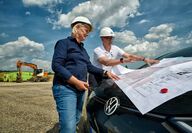
In spite of a robust collection of new hybrid and electric vehicle models coming out, Volkswagen's hottest project may not be a car. With batteries being the most expensive component in an EV, at roughly 40% of the overall cost, Europe's largest automaker is going straight to the source by investing in Canadian mines. For now, plans for what potential sites are being investigated and what investments are being made have not yet been disclosed. Partnerships between vehicle manu...

CTR signs MOU to purchase six geothermal power plants from Fuji Electric Corp. With the signing of a contract for $1.4 billion of geothermal power facilities built by Fuji Electric Corp. of America, Controlled Thermal Resources takes one enormous step toward its goal of producing large quantities of low-carbon lithium for electric vehicles and electricity at its Hell's Kitchen project in the Salton Sea area of Southern California. "Today marks the beginning of a clean energy...

As more and more companies answer the call to supply the materials needed to fuel the clean energy transition, American Battery Technology Company has been doing its part to establish a strong foundation to provide electric vehicle manufacturers and other renewable technology companies with critical battery metals for decades to come. Founded in 2011, ABTC (formerly known as American Battery Metals Corp.) began with a few mining claims out of Nevada. Spun out from a former...

Li-Bridge alliance unveils blueprint to build resilient US lithium battery supply chain. A wide chasm lies between where the United States is today and securing the lithium battery mineral resources and manufacturing capacity required to achieve ambitious visions of a green energy future where electric vehicles are charged with low-carbon energy. An alliance of America's national laboratories and more than 40 companies representing the entire lithium battery supply chain have...
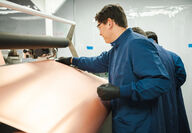
Loan will support US plant capable of producing EV battery materials at the giga-scale. Toward the White House's goal of zero-emission vehicles making up half of all car sales in the U.S. by 2030, the U.S. Department of Energy has conditionally committed to lend $2 billion to Redwood Materials Inc. to support the expansion and construction of a battery recycling and manufacturing complex in Nevada. Announced on Thursday via the DOE Loan Programs Office, Redwood will use the...

Electric vehicles are a major player in the decarbonization of the global transport sector. The industry is under pressure to seek the shortest, most profitable route to a renewable future, which puts its most expensive asset – battery production – at risk of potentially redistributing rather than neutralizing carbon usage. Nowhere is this pressure more acute than in the growing demand for a more sustainable and scalable battery lifecycle. Due to roughly 15 years of ope...

Supply constraints slow installations; WoodMac expects li-ion batteries to dominate energy storage in US over next five years. The transition to clean electricity generated from intermittent sources such as solar and wind is energizing the energy storage sector in the United States. Supply chain constraints, however, are acting as an insulator to growth of battery installations that ensure the balance between energy supply and demand. According to the fourth quarter 2022 U.S....
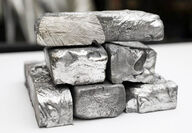
Highly promising startup reveals first commercial-scale rare earth element refinery in the US. Rising from the ashes, an American startup that was early in the field of rare earth element separation, Phoenix Tailings, has made a brilliant comeback with the announcement of the first rare earth refinery to begin production in the United States. Founded in 2018, Boston-based Phoenix Tailings had a significant head start at the onset of the COVID-19 pandemic. Seeing the potential...

Setting up in one of North America's fastest-growing lithium-ion battery development zones, Volkswagen Group has foreseen the potential and has opted to build its next gigafactory outside of Europe in the city of St. Thomas, Ontario. The St. Thomas factory is a joint venture between VW and PowerCo SE, a new independent company created by the automaker to oversee its massive $20 billion battery initiatives. With two other gigafactories currently in development, this latest...
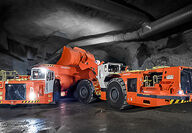
In Norway, the Rana Gruber iron ore mining and mineral processing operation has purchased a fleet of 19 battery-electric vehicles from Sandvik. The order is being filled during this year's first quarter through 2024 and is Sandvik's second-largest battery-electric mining fleet sale to date. Valued at 370 million Swedish kronor (US$35.5 million), the Rana Gruber order includes eight drills, six trucks, and five loaders, along with on-site support and batteries for the fleet....

US business and political leaders call on USGS to expediently add copper to list of critical minerals. Copper is essential to a global economy that favors low-carbon electricity powerlines over fossil fuel-filled pipelines to deliver future energy needs. But does the green energy demand make the red metal critical? So far, copper has not been elevated to the official list of minerals and metals deemed critical to the United States. A surprisingly broad spectrum of politicians...

Marking a significant milestone in its role as a leading electric vehicle battery recycler, Electra Battery Materials Corp. announced the successful recovery of technical-grade lithium carbonate from a black mass recycling trial conducted at its refinery north of Toronto, Canada. Black mass, the material remaining once expired lithium-ion batteries are shredded and all casings removed, typically consists of some mix of lithium, nickel, cobalt, manganese, copper, and graphite...

With the world-class deposits already found within its borders, the United States has the potential to be a major global producer of copper, lithium, and the other minerals and metals critical to the clean energy transition. Realizing this potential, however, will require reserves of political will in Washington, DC, that match the nation's domestic energy metals endowment, according to R Street Institute. "Despite political rhetoric and policies promoting the use of domestic...

While lithium-ion batteries have become omnipresent for nearly all portable energy needs, we have quickly found that they are ultimately limited in what they are capable of. Enter Vienna University of Technology, where German scientists have found a way to harness the most abundant element on earth to breathe new life into the future of energy storage. Exploring new battery chemistries for the green energy transition, researchers at Vienna University of Technology, or TU Wien,...

DOE funds studies into processes for recovering rare earths and other critical minerals from coal waste streams and acid mine drainage. Looking to develop unconventional domestic sources of the rare earths needed for America's transition to low-carbon energy and transportation, while also providing forward-leaning job opportunities for the coal miners that powered the nation for more than a century, the U.S. Department of Energy is providing $16 million for the development of...

Already pushing the boundaries of portable energy storage technology through its development of solid-state batteries, Energy Exploration Technologies Inc. or EnergyX, announced a US$50 million funding from General Motors Co. to help the company develop its lithium extraction and refinery technology. EnergyX's direct lithium extraction (DLE) technology can extract lithium metal directly from brine and potentially in anode-ready form for electric vehicle batteries, enabling a...

Global electrification of an extensive amount of industrial processes necessitates a counterbalance to the wave of new mining required for the electric vehicles and renewable energy infrastructure to meet carbon neutrality imperatives without doing further damage to the environment or simply displacing problems to other areas of the value stream. Technologies for capturing carbon dioxide are improving, but the captured CO2 still needs a rock-solid alternative to expensive... Full story

Since starting electric heavy truck production in 2019, Volvo has swiftly become a leader in the market with a running tally of 4,300 vehicles on the road in over 38 countries, including nearly half of all heavy electric trucks registered in North America last year. Additionally, the demand for zero-emission trucks over 16 tons has increased by 200% in Europe just in the last year, and Volvo Trucks holds the highest share of that market. Volvo currently offers the... Full story

While air conditioning was a marvel of its time, concerns over the Earth's climate has led to the pursuit of more efficient energy consumption and management. Now, researchers at the University of Chicago's Pritzker School of Molecular Engineering have designed a chameleon-like building material made with copper that changes its infrared color – and how much heat it absorbs or emits based on outside temperature. "We've essentially figured out a low-energy way to treat a b... Full story
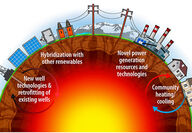
Geothermal power has generally represented region-specific and niche clean energy in the public consciousness for over a century. Today, thanks to a profusion of social outreach and government incentives, investors and leaders across both public and private sectors are exploring lesser-known applications and exciting advancements in the field. Just a few feet below the surface, the earth maintains a near-constant temperature that belies the seasonal extremes of aboveground... Full story

Becoming the frontrunner of battery recyclers, Electra Battery Materials Corp. announced that it has successfully completed the first plant-scale recycling of black mass material in North America, recovering critical metals such as nickel, cobalt, and manganese needed for the electric vehicles of the low-carbon future. Colloquially known as black mass, it is essentially the remains of pulverized lithium-ion battery anode and cathode materials. Imperative toward the...

The U.S. Department of Energy has published a portfolio of research and development projects on the commercialization of aluminum-cerium alloy that offers a possible solution to the overabundance of the most abundant rare earth element. The clean energy transition depends on critical materials like rare earth elements that power wind turbine generators, electric vehicles, and other clean energy technologies, materials, and processes. Typically, REEs are found together in... Full story

The challenge of reducing emissions from the mining industry as a whole is ongoing and especially vital for the metals needed in renewable power and de-carbonized transportation. Taking center stage in this push, the electric vehicle space is being tasked to evaluate the overall environmental impact of EV battery life cycles. Scalable solutions are needed by 2030 for the anticipated first wave of batteries soon reaching end-of-life to keep them out of the toxic waste stream....

Investing C$3.6M into sustainable graphite anode materials tech being advanced by the company. To further solidify Quebec as a vital link in North America's lithium-ion battery supply chain, the provincial government is providing Nouveau Monde Graphite Inc. with up to C$3.6 million (US$2.7 million) to further develop technologies to sustainably transform mined graphite into battery-grade anode material for electric vehicles. "The funding announced today will boost our...